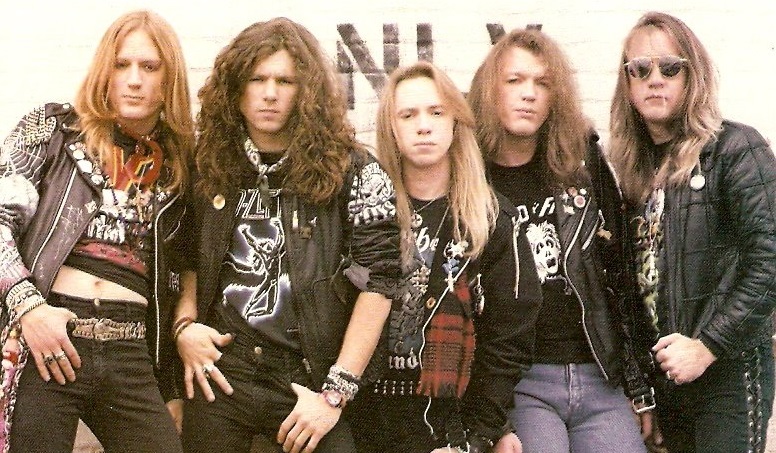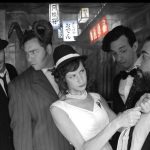Ross Flournoy is a pretty smart guy.
The lead singer/guitarist of The Broken West, an indie-rock band out of Los Angeles, Flournoy likes to entitle songs after archaic 16th Century French terms (Ambuscade, look it up) and albums after quotes by Irish dramatist Samuel Beckett I Can’t Go On, I’ll Go On.
Before he took a shot at rock stardom, Flournoy received a BA in political science from Amherst College (the No. 1 Liberal Arts college in the country!), and later taught SAT training courses for a tutoring company. “It was small firm and I really loved the people,” Flournoy said. “But I didn’t really love working in an office. And no, I don’t have any hellacious stories from working there.”
Hellacious. Good word.
In the search to determine the state of the music industry, Flournoy’s story illustrates where the business is headed. Forget radio and music charts; today it’s about Internet exposure, iTunes, and, for Flournoy’s band, a 30-second snippet on a hit television show.
So when asked “Where is the music industry going?” leave it to this smart guy to give a moving response.
“It’s the same thing with airlines.”
Airlines?
“They have been in a constant state of disarray and at the edge of collapse for the last 10 years,” he said. “But people still have to fly. I feel the same way about the music business. Music is a really important part of people’s lives and there’s going to be a demand for it. People are always going to need it.”
Airlines. Of course.
• • •
Grading the present state of the industry has many thinking of the letter D — dour, disrupting, dumbfounding. And dying. The album is dying, major labels are dying. Gas prices are killing tours. If the music industry were a cow, it would be hamburger. And it would infect you with mad cow.
Because right now, it’s kinda crazy. To wit:
• The public used to hear new songs between commercials on radio shows, now people hear new songs between shows on television commercials.
This is good — or not so much.
“I crave the ideal of discovering a new band or song yourself better than people saying ‘This is good, you should listen to this,’ or hearing it from an ad,” said Jason McMaster, a vocalist, bassist, songwriter and rock metal enthusiast from Austin, Texas. “I almost feel like I’m being raped if I actually hear something I would probably like if I heard it somewhere else other than a movie soundtrack or HBO sit-com. I might hear a rock song that’s kicking my ass and say, ‘Dude that’s pretty cool, but why am I hearing it on a TV commercial?’ But that’s the marketing now.”
Flournoy has another take. “Down in the Valley,” a song off The Broken West’s debut album, worked its way onto the smash TV show Grey’s Anatomy. New fans then worked their way to The Broken West.
“I found out about more than a few bands through commercials,” he said. “I think it’s an incredible way for bands to make people aware of new music. It’s the new radio. For the musician, licensing is a great way to make money. The first year after our record came out, we were able to support ourselves through the licensing money we got through having songs on TV shows. People who rant about being a sellout, I think is just crazy. That’s an antiquated, stupid argument.”
• Album sales fell at a precipitous rate — from 785.1 million albums sold in 2000 to 500.5 million in 2007 according to Nielsen SoundScan — but in recent years sales of vinyl increased by double-digit margins. This is more confounding after discovering record stores are closing — almost 3,000 in the last decade — because indie record distributors are selling releases to big box stores at wholesale costs.
“It seems everything is shook down,” said Brendan Toller, a filmmaker who recently released I Need That Record!: The Death (Or Possible Survival) of the Independent Record Store. “The majors still haven’t realized the reality out there. Things are being downloaded 12 to 1 for every piece of music being sold. That’s nuts. Does the industry know that? I don’t know because they’re not making any significant steps.
“But I wouldn’t say albums are dying when people are buying vinyl the way they are,” Toller added. “The way we’re obtaining albums is certainly changing. A CD costs maybe $10-12 new if you get it the first week. But that’s still a lot of money when gas prices are $3.65 a gallon. You can bet if I’m not sure about something I’m going to download it (laughs).”
• And MySpace, an Internet tool allowing musicians to find an audience outside their sphere, is so flooded with band sites that rooting through the A’s is a weekend of work.
“The thing about the Internet is you have to hope people find you,” said Mike Turner, who runs Athens’ label Happy Happy Birthday to Me Records and works at Wuxtry Records as one of its main buyers. “When MySpace first came out, I was like ‘This is great, now we can do all kinds of promotion.’ But now it’s so bogged down. In MySpace someone can create a band profile without having a point. People will record a demo on their computer, put it right up and put a band name to it. It makes me think: Really, are you serious about it?
“Some people send stuff to me and say ‘Check out my MySpace,’ ” Turner added. “Hey, I’m glad you’ve been able to comprehend what it takes to load photos online and pick a background color, but that doesn’t say you’ve played shows.”
“It used to be TV babies and then it’s Internet babies and now it’s MySpace babies,” McMaster said. “It’s the only way some people know how to communicate. What I don’t like about MySpace is people think that’s the be-all and end-all of cool. That’s just sad.”
• • •
The road leading to this music madness is long and winding, but could well be a road to nowhere (or perhaps a highway to hell).
“I come from a time when Metallica got a record deal because they used to make their own cassette tapes and hand them out, lick envelopes and stamps and put them in the mail and give them out for free at their shows,” McMaster said. “People got to take something home with them from a show or party where they met the guys from Metallica.”
McMaster got his start in the early 1980s in Watchtower, a progressive metal band considered the pioneer of the metal math movement. While Watchtower served as a powerful influence for many, it never shook its underground status. When McMaster had to choose between staying with the band he’d been with for several years, or take a chance with Dangerous Toys, a new band he was fronting on the side, he opted for the new band.
Dangerous Toys was a rousing metal band with humorous lyrics to go with its cock-rock poise. With the industry aflutter after the rise of Guns N’ Roses, Dangerous Toys hit its stride at the perfect time. Its 1989 major label debut, Dangerous Toys, went gold, featuring the ever-popular singles “Teas’n, Pleas’n” and “Scared.”
“For whatever reason, I made it easy for them to throw it out there and have it stick on the wall the first day it came out,” McMaster said.
His hard rock success was emblematic.
“In the early ’90s when all sorts of shit was hitting the fan, radio sensibility went to real heavy rock,” he said. “It was opened by Nine Inch Nails and Metallica, bands that were selling well at the time. The sensibility that radio was starting to play heavier music was a weird time. You could actually hear a heavy metal song on the fucking radio.”
It set the stage for a dynamic shift, steered by the little band that could.
Nirvana was not your typical chart-climbing band. Lead singer Kurt Cobain, with his yelping lyrics and dour subject matter, was nothing like the popular hair bands. While Poison was singing about thorns and roses, Cobain was singing about rape and lithium.
It struck a chord.
Spurred on by “Smells Like Teen Spirit,” Nirvana exploded, bringing the city of Seattle with them. Just as the early ’80s, with majors clamoring for new wave artists, and the late ’80s, with the rise of hair metal, grunge became the next “it” scene. Pearl Jam, Soundgarden and Alice in Chains all rode the Nirvana wave.
Suddenly the alternative was popular. And who would take notice?
Wal-Mart.
Not wanting to miss this alternative nation, Wal-Mart sought the hip stuff for their shelves. Ordering titles by the truckloads, the biggest of the box stores brought alternative to the masses.
Except there was one problem.
“Suddenly you could find a Jon Spencer Blues Explosion record at Wal-Mart, which was amazing,” Turner said. “But no one was buying it. These indies were getting orders that were obnoxious, but after a year were getting a huge return. I guess the Wal-Mart shopper just wasn’t getting behind Liz Phair or the new Yo La Tengo. Here is what the majors saw: This indie ghetto stuff just isn’t selling. So instantly they were over it.”
Years later this theme would reappear, except the role of Wal-Mart was being played by Best Buy.
“Best Buy did a thing where they got in with a distributor, and said ‘We’ll give you your own rack for hot indie releases and buy them at this price,’ ” Turner recalls. “But then Best Buy didn’t mark them up. They bought the new Cat Power and Arcade Fire and they were selling them at cost.
“At Wuxtry we were paying 70 cents more just to buy these records from the labels. All the indie labels putting this deal together were just screwing these Mom and Pop indie stores where there was a Best Buy in town. This deal made it so the Broken Social Scene record was a dollar difference for us to buy. So we went to Best Buy and bought everything off the rack. We’re going to sell them anyway, so we’d buy all the Antony and the Johnsons records they had because they’re not going to sell it. It was amazing how quickly these indies didn’t think about that, jumped back and said ‘Wow, we’re really sorry.’ Best Buy is not going to care about your Bon Iver’s or your Jaguar Love. It was a real bummer situation.”
• • •
Downloading. MP3s. Illegal file sharing.
Talk about the death of record stores, the proliferation of Best Buys or plummeting album sales all you want — the real paradigm shift came with the onslaught of the Internet.
The Internet made the music world flat. A teenager in North Dakota could find the latest obscure 7-inch from a New York band as quickly as a teenager in Manhattan.
This was a good thing.
“One of the great things open Internet provides is a way for musicians to work with fans to have two-way communications,” said Ann Chaitovitz, executive director of the Future of Music Coalition in Washington D.C. “The Internet has provided artists with a lot of options. One of my hopes is having these options leads to better contracts. Artists will have options now they didn’t in the past.”
“The Internet is helpful for being able to connect with new people and disseminate music quicker and without impediment,” Flournoy said. “The neatest thing is getting music to people quickly. Back in the ’60s, things were recorded and released in pretty short order. I like that immediacy of recording something and being able to get it to people who want it in a couple of hours.”
But music fans started to share as well — much to the howls of the majors. Napster, an online MP3 file sharing service created in 1999, allowed people to share music without paying for it, causing the industry to stew over massive copyright violations. Napster was shuttered, but peer-to-peer programs took its place, making the Internet a Wild West for music fans with little money but tons of bandwidth.
This was a bad thing.
“People aren’t stupid,” Toller said. “They’re not going to buy a $17 list price CD that has three tracks they like. People want to check out the album first and if it’s really good they’ll buy it.”
Or not.
• • •
So what is the future? Will vinyl climb? Will majors win? Will indies take over?
“I’m optimistic,” Chaitovitz said. “After a period of disruption and turmoil, I think we’re going to come to a place where consumers, music fans and musicians are better off. Right now the industry has survived on one income stream. That will change. Music fans will have more options to get music in different ways in different price points and different formats. And musicians will be able to connect with fans and distribute music with less gatekeepers and middlemen.”
“Indies will be the music industry in 10 years and there really won’t be any quote unquote majors,” Flournoy said. “They’re evaporating with each passing day. It’s like our economy in America. We’re not a manufacturing country anymore. Our economy is based on the service industry. Things change. The music business is no different. Who knows what form it’s going to take, but it will still be around. It’s just going to be different. I don’t feel musicians will be put out of business. I’m cautiously optimistic, but it’s going to be tough.”
Not everyone agrees the majors are on their way out. Turner sees them slowly adapting (selling more vinyl with download codes, reissuing back catalogues), waiting to make their move.
“Major labels are scrambling to figure out what’s going on,” he said. “But I can see what’s coming up next, like what happened in the mid ’80s and the early and late ’90s, where the majors were at the point they put out the stuff they normally do — like the Britney Spears — and now are where they snag whatever the top selling indies are. It always happens. Whenever a band rises up enough a major will come take them.”
But before a band can rise up, it has to get noticed. For Flournoy, getting noticed came during a 30-second slot on television, exposing his music to many who wouldn’t have found it otherwise. For McMaster, the future is all about the fan — no matter how they find the music.
“What I’m on my pedestal about is rejuvenating the rock fan,” he said. “There are people who call themselves rock fans who don’t have a problem with whatever trash is coming through the airwaves. I have a problem with that. We are becoming more dumbed down, told how it’s gonna be and whoever has the most money wins. The taste-makers are dangerous because they are going to put the little guy out. The little guy is always gonna be losing, and once you get over that — and that’s a lot to get over — that makes me not want to do this anymore.
“But I love writing and playing so much that it’s not about that, it’s not about the business. I don’t have tour support, I don’t have label support. The only support I get is from friends and fans who love it and are willing to help out and work to push my music. You have to create your own little army to promote your band. That’s the way it’s always been.”




